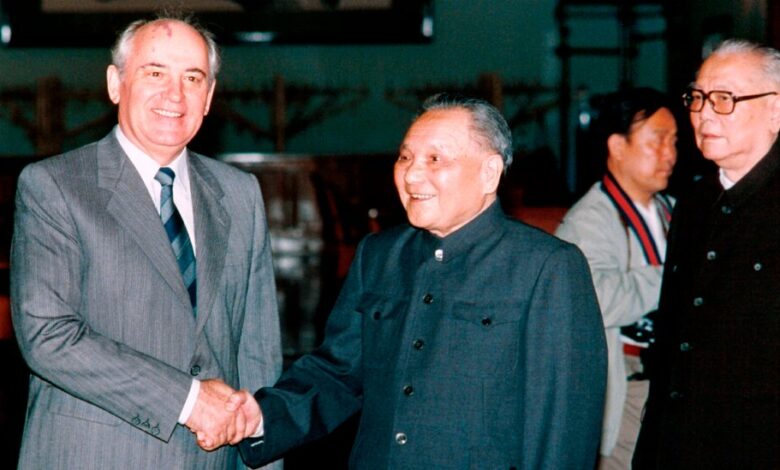Your Thursday Briefing: How Authoritarians See Mikhail Gorbachev


Mikhail Gorbachev, left, with Chinese leader Deng Xiaoping in 1989. Both oversaw reforms that later leaders worked to undo.Credit…Catherine Henriette/Agence France-Presse ,via Getty Images
Gorbachev’s lesson for authoritarians
Mikhail Gorbachev, the Soviet leader whose death was announced on Tuesday, is hailed in much of the West as a visionary who brought the Cold War to a peaceful conclusion. But in other parts of the world, his legacy stands as an example of power discarded quickly and cavalierly.
This lesson has been taken to heart in China, which has cracked down on dissent and heightened the glorification of the Communist Party. President Xi Jinping, who is poised to begin his third term as supreme leader, called the collapse of the Soviet Union “a cautionary tale.”
President Vladimir Putin spoke of the Soviet Union’s fall the day Russia invaded Ukraine: “We lost confidence for only one moment, but it was enough to disrupt the balance of forces in the world.” He has called it the “greatest geopolitical catastrophe of the century.”
In a conciliatory statement, Putin called Gorbachev a “statesman” who “strove to offer his own solutions to urgent problems.” Kremlin propaganda was more critical: “Mikhail Gorbachev can serve as an illustration that good intentions of a national leader can create hell on earth for a whole country,” said a column from a state news agency.
Quotable: “All of Gorbachev’s reforms are now zero, in ashes, in smoke,” the radio journalist Aleksei A. Venediktov, a friend of Gorbachev, said in July. “This was his life’s work.”
Interview: Gorbachev spoke with The Times in 2016, shrugging off how he remained among the most reviled men in Russia. “It is freedom of expression,” he said.
American life expectancy plummets
The average American can expect to live to 76, down almost three years from nearly 79 in 2019, federal health researchers reported.
That drop is staggering. Until now, experts have been accustomed to measuring life expectancy changes by months, not years.
The coronavirus pandemic is largely to blame. A rise in accidental deaths and drug overdoses also contributed, as did deaths from heart disease, chronic liver disease and cirrhosis, the new report found.
Americans also suffer from an amalgam of influences that experts have called “the U.S. health disadvantage,” said Dr. Steven Woolf, director emeritus of the Center on Society and Health at Virginia Commonwealth University. The result is a high disease burden and shorter life expectancy compared with other nations with comparable incomes.
Native Americans: The reduction has been particularly steep in Native American and Alaska Native communities, who have seen a cumulative decline of more than six and a half years on average since the start of the pandemic. That puts their average life span at 65, the same figure for all Americans in 1944.
Battling Covid: The Food and Drug Administration on Wednesday authorized the first coronavirus vaccines that target Omicron subvariants. New booster doses could be available as soon as next week, but ample evidence suggests that Americans may hold back from additional shots.
Typhoon Hinnamnor hits Japanese islands
Typhoon Hinnamnor, which forecasters said was the strongest tropical cyclone in the Northern Hemisphere this year, buffeted islands southeast of Okinawa with sustained winds of 120 miles per hour and gusts of up to 172 miles per hour.
Weather officials in Japan warned that the storm could drop about seven inches of rain on the islands by Thursday morning and potentially bring enough force to destroy homes.
Government forecasts suggested on Wednesday that Hinnamnor would most likely head north toward the southern tip of the Korean Peninsula.
Climate change: Researchers have found that climate change increases the frequency of major storms because a warmer ocean provides more of the energy that fuels them.
THE LATEST NEWS
Asia
-
Mahathir Mohamad, the former prime minister of Malaysia, was hospitalized with Covid.
-
Taiwan said it would counterattack if Chinese forces entered its territory, Reuters reported.
-
Japan rolled back some of its strict Covid restrictions on tourism, but individual tourists who are not part of a package tour are still not permitted, The Japan Times reports.
-
According to Reuters, the U.S. and South Korea began their largest military field exercises in years.
World News
-
Violence driven by drug cartels is raging in Mexico.
-
Artificial intelligence scans of satellite images helped tax collectors in France find more than 20,000 unreported pools.
The War in Ukraine
-
President Putin has avoided a draft to maintain domestic stability in Russia, even though he needs reinforcements.
-
Experts from the United Nations’ nuclear watchdog agency traveled in a convoy of armored S.U.V.s to visit the imperiled Zaporizhzhia Nuclear Power Plant.
What Else Is Happening
-
Investigators revealed that Donald Trump likely concealed and removed government records from a storage room at Mar-a-Lago after the Justice Department subpoenaed him.
-
Serena Williams and Naomi Osaka played in this year’s U.S. Open, perhaps the last time they will compete in the same tournament.
-
An industrial concept called “circular manufacturing” aims to build cars with components that can be reused to make new cars.
-
Snap, the social media company behind Snapchat, is laying off 20 percent of its employees and discontinuing at least six products.
A Morning Read
After the Taliban took over Afghanistan last year, the goalkeeper of the women’s national soccer team knew she could be killed for playing her sport. She buried her jerseys and trophies in her courtyard and narrowly escaped to Australia. This is her story.
ARTS AND IDEAS
Humpback whale songs spread across oceans
Humpback whales go through long-range, high-speed cultural evolution, and they don’t need the internet or satellites to keep it running.
In a study published on Tuesday, scientists found that humpback songs easily spread from one population to another across the Pacific Ocean. It can take just a couple of years for a song to move several thousand miles, from whales in Australia to whales in Ecuador.
“Half the globe is now vocally connected for whales,” said Ellen Garland, a marine biologist at the University of St. Andrews in Scotland and an author of the study. “And that’s insane.”
Researchers have uncovered a complex, language-like structure in these songs that male humpbacks gradually embellish, resulting in different melodies between populations. The songs may be spreading when humpbacks migrate from their breeding grounds to foraging grounds close to Antarctica, when males from different populations may swim near each other.
No one is certain why the whales sing. But scientists think that the songs may be a way to attract a mate, and a new tune could be more enticing.
PLAY, WATCH, EAT
What to Cook
This vegetarian sheet-pan recipe for crispy spiced chickpeas with peppers and tomatoes has verve to spare.
What to Read
Ronald Spector’s “A Continent Erupts” chronicles the decade of conflict in Asia after World War II.
Where to Visit
Tourism is booming in the Italian town of Chioggia, which has long lived in Venice’s shadow.
Now Time to Play
Play today’s Mini Crossword, and a clue: Rock out (3 letters).
Here are today’s Wordle and today’s Spelling Bee.
You can find all our puzzles here.
That’s it for today’s briefing. See you next time. — Dan
P.S. Introducing the inaugural members of The New York Times Corps, in which Times journalists provide career guidance for college students.
The latest episode of “The Daily” is on the Parkland shooting aftermath.
You can reach Dan and the team at [email protected].




